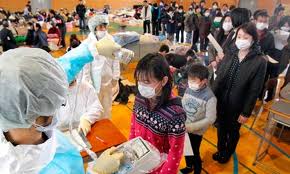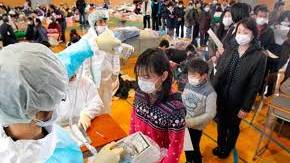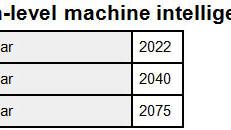Scientists Admit: We Don’t Know the Impact of Fukushima Radiation on Humans
Source: occupycorporatism.com
Researchers publishing on the National Institutes of Health (NIH) have released a study (that is now scrubbed from the internet) that centers on the need for establishing “reliable and accurate radiation dose estimates for the affected populations.” This study was released in January of 2014. It details how scientists do not know the impact of radiation exposure to the human body and how the long-term effects of exposure to Fukushima radiation is still unknown.
This study was released in January of 2014. It details how scientists do not know the impact of radiation exposure to the human body and how the long-term effects of exposure to Fukushima radiation is still unknown.Indeed, this study refers to the fact that currently the “strategies for dose assessment” when involving nuclear accidents which are haphazard and do not follow a universal scientific method.
In this study, researchers “propose a comprehensive systematic approach to estimating radiation doses for the evaluation of health risks resulting from a nuclear power plant accident.”
The study asserts: “The guidelines we recommend here are intended to facilitate obtaining reliable dose estimations for a range of different exposure conditions. We recognize that full implementation of the proposed approach may not always be feasible because of other priorities during the nuclear accident emergency and because of limited resources in manpower and equipment. The proposed approach can serve as a basis to optimize the value of radiation dose reconstruction following a nuclear reactor accident.”
According to the report, deciphering the dangers of “radiation exposure following nuclear accident” is based on “medical planning, emergency response, and immediate consequence management but is limited for the collection of radiation exposure–related data needed to predict or estimate risks for late health effects.”
Indeed, this issue poses a problem when there are no established “guidelines to estimate radiation doses for evaluations of health risk.”
The researchers studied Fukushima, Chernobyl, Windscale and Three Mile Island nuclear plant disasters for comparison and strategy.
Two questions were posed:
- Immediately after the accident: What adverse health effects should be expected as a consequence of the accident?
- Years after the accident: What were the actual health consequences caused by the accident?
The answer to these questions further how these disasters could be dealt with and “health risks” could be evaluated based on “risk projections and epidemiological studies.”
[...]
Read the full article at: occupycorporatism.com
---
Join the Fukushima Radiation Watch
By Ben Richmond | Motherboard
Whether you’re worried about splashing in a radioactive surf, threats to ocean life, or just like filling up containers with water, you can help scientists watch for evidence of some of those 300 metric tons of contaminated ground water from Fukushima’s nuclear plant that seeps into the ocean every day finally reaching America, by lending your time and/or your treasure.
[...]
As the Center for Marine and Environmental Radiation at Woods Hole Oceanographic Institution puts it , though, whether or not "you agree with predictions that levels of radiation along the Pacific Coast of North America will be too low to be of human health concern or to impact fisheries and marine life, we can all agree that radiation should be monitored.” The institution then calls on that same public to lend a hand.
Read the full article at: motherboard.vice.com






















